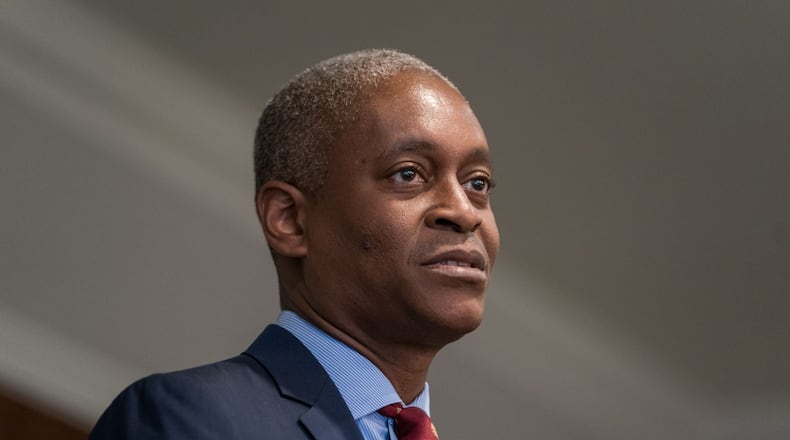The head of the Federal Reserve Bank of Atlanta said navigating the economy right now is like driving through fog, when motorists can’t see far ahead and have to slow down or pull over.
Tariffs. Retaliation by other nations. Technological disruption. Geopolitical crises.
All of it compounds, and it’s putting the economy in a “pause position,” with businesses not comfortable making big investments, Atlanta Fed President and CEO Raphael Bostic said at an Emory economics banquet Monday evening.
But in his remarks, Bostic also sought to shed light on key topics affecting the economy today — including issues particularly relevant for Emory students in the audience who will soon enter the job market.
Could the U.S. manufacturing be competitive globally?
Because a key motivation for the Trump administration’s new tariffs is to drive a resurgence of factories in the United States, many are wondering if it makes sense for companies to make those kinds of investments.
What would it mean for the job market if many new plants opened in the U.S.? Who would work in them?
And can manufacturing in the U.S. — where labor costs are higher than the developing countries known for factories — be competitive enough against rivals around the world?
The U.S. is still a manufacturing giant. But over the past several decades, U.S. companies shifted production of textiles, electronics, toys, furniture and other goods overseas, taking advantage of lower labor costs. That in turn has largely lowered the relative costs of the goods many consumers and businesses buy. It’s also cost the U.S. traditional manufacturing jobs, though other jobs have been created in logistics and other sectors.
Bostic said part of the question about a potential return of that type of manufacturing to the U.S. is: “If people like costs the way they are today, can you do this and not get people upset because costs go up?”
That’s complicated, he said, and will depend on the technology used for production.
“There may be ways to use technology, leverage AI (artificial intelligence) and other things, to produce in a way such that the American worker becomes the most productive worker,” Bostic said.
He said he was recently told about how factories in Vietnam “are using extremely high quality and advanced technology.”
For companies to be competitive with higher marginal productivity of labor in the U.S., “It’s going to take work,” Bostic said.
“This is not something that’s just going to happen by putting up some walls, by opening the door and saying you’ve got a factory,” Bostic said.
It will require “some serious engineering to make that happen.”
How is the Trump administration’s crackdown on immigration affecting economy?
The Trump administration quickly launched a deportation campaign as part of the president’s immigration crackdown.
There have been signs of impacts on the construction labor market in Atlanta, The Atlanta Journal-Constitution has reported.
Bostic said the Atlanta Fed collects data to learn more about these and other types of issues in the economy with surveys of business leaders, community groups and nonprofits through its Regional Economic Information Network.
“What we’ve heard to date is that for most businesses, it has not been material in most sectors,” Bostic said.
However, the impact is significant in some sectors, including home building, Bostic said.
“We’re definitely hearing that they are finding it more difficult to find folks in the trades to build houses,” Bostic said. “We’re going to continue to keep an eye on that.”
Could AI take your job?
Bostic also touched on one of the issues that has been driving anxiety in the workforce in recent months and years: AI.
He relayed an anecdote that served as a warning for the well-educated, high-aspiring Emory students in the audience.
Bostic said while he was at lunch, “Someone was saying that they didn’t think that we would need the same number of attorneys.”
That’s because at a law firm or legal department, AI could be used to gather a lot of the historical background needed to prepare for a case.
Attorneys typically have gone to four years of college and three years of law school, and have other experience, such as clerkships, he noted.
“They have a tremendous amount of human capital built up, and yet, they’re going to be positioned potentially to be disrupted,” Bostic said. “I think this is going to show up in a lot of different places.”
He said he expected the disruption to show up “throughout our income distribution, in a way that new technologies often don’t.”
“I think it’s going to be quite a bit different than what we’ve seen in other areas of technological change,” Bostic said.
What it means is that for people who “understood the game” of today’s economy and have a lot of education or specialization in a skill with the expectation of a good salary and job security, AI could potentially “change the notion of that social contract,” Bostic said.
“I think the AI genie is out of the bottle,” he said. “So, the change is coming. … What we will all have to do is figure out how to pay attention and to anticipate where that change is going to show up.”
“I think moving forward, adaptability is going to be one of the most important talents or skills that a person can have in a society that is changing so rapidly,” Bostic said.
He told the Emory students in the audience that “you all have to learn to be comfortable and ever-willing to adapt and become a different person, position yourself differently in the economy moving forward.”
About the Author
Keep Reading
The Latest
Featured



